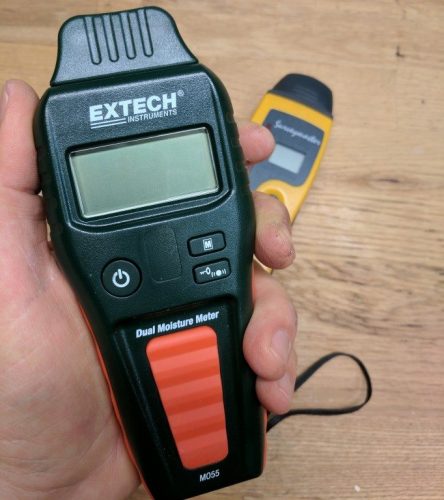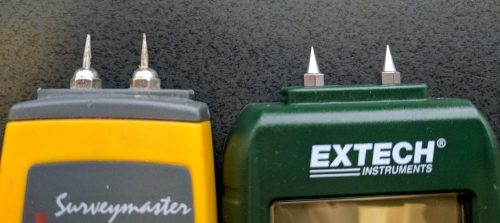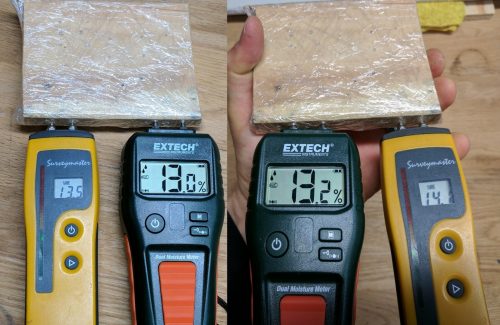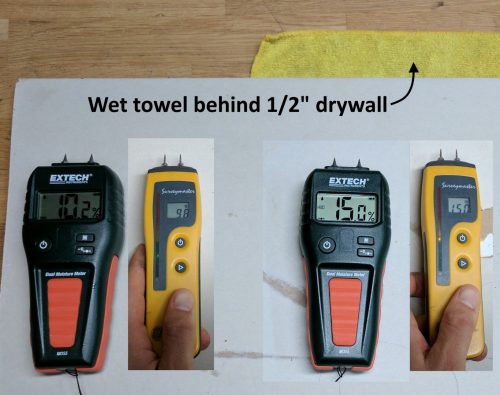I recently heard about the Extech MO55, dual-function moisture meter that retails for about $80 on Amazon. I’m a big fan of my $475 Protimeter Surveymaster moisture meter for all-purpose use, as well as the $450 Tramex Moisture Encounter Plus. As you might imagine, I was quite skeptical about an $80 moisture meter. I’ve tried a lot of moisture meters, and I dislike most of them. I heard about this one from my home inspector friend in Seattle, Charles Buell. He convinced me it wasn’t half bad, so I tested it out. He was right.
The basics
This moisture meter has pin probes at the top for taking moisture readings in wood and other building materials, such as drywall. It also has a scan mode that can be used to look for moisture in drywall, wood, behind vinyl and wood siding, and many other places. There is also has a scan mode for concrete, but that’s not a feature that I use, so I didn’t test it.
Size and shape
The size and shape of the MO55 is marginal. It feels ok in my hand, but not nearly as nice as the Protimeter Surveymaster. It’s a lot wider, making it so I can’t wrap my fingers all the way around it. I see myself dropping this a lot. The wider shape also makes it much more difficult to slip into a tool pouch.
I also don’t care for the pins. They’re cone-shaped, so they don’t stick into stuff.
I had to keep pressure against whatever I was pushing into to get an accurate reading. With straight pins on the Surveymaster, I can stick the pins into wood and the meter supports itself. Not so with the cone-shaped pins of the MO55. I’m sure this makes them more durable, but I haven’t had an issue with destroying my pins.
Accuracy
I tested the MO55 against my Surveymaster in pin probe mode, and the results were close enough. It wasn’t easy to keep the moisture readings of the MO55 consistent without keeping the moisture meter pushed into the wood, which is why I’m holding the wood in the image at right; I’m pushing the meter into my chest to keep the pins embedded for the photo.
The scan readings were consistent with my Surveymaster when used to detect a wet towel behind a piece of 1/2″ drywall.
The response times were quite similar as well. See the video clip below.
When I used these moisture meters on vinyl siding with wet sheathing behind it, however, I didn’t feel nearly as confident with the readings given by the MO55. I guess I feel much more confident watching the analog lights on the side of the meter than the digital display. Check out the video clip below to see what I mean.
As you can see in the video, the Surveymaster sounds off when it finds the wet sheathing. The MO55 doesn’t make it so obvious that there’s a problem, but it does identify high moisture levels.
Other Stuff
There is no external jack on the MO55, which means that external probes aren’t an option. Without the ability to connect external probes, I would only use this moisture meter as a backup. It does have a lid with a self-calibrating feature built in, however, which is handy.
MO55 Conclusion
The MO55 is a great deal for $80. I’ve had a lot of people ask me about a more cost-effective moisture meter than the Surveymaster, and I think this is the one. It won’t replace my Surveymaster, but it would make a nice backup.





Will Johnson
July 29, 2017, 9:20 am
I leave my moisture meter in my bag. Too many false positives, no protocol of when and how to use them. There is no training for the home inspection from anyone. ASHI/CREIA/InterNachi do not provide any direction. Do you provide any disclaimers? Do you do intrusive testing in a home inspection? This could be a liability issue for the untrained
Reuben Saltzman
July 30, 2017, 6:13 am
Hi Will,
I don’t provide any types of disclaimers when using my moisture meter. I feel very confident in the results that I provide. If I had to disclaim my findings and recommendations, I don’t think they would be worth making.
My company does provide intrusive testing, but not as part of a home inspection. Those are special inspections that homeowners need to give permission for. I recently taught a 2-hour class to my ASHI Chapter on finding water intrusion at exterior walls, and a lot of that class was focused on using a moisture meter to do so. We recorded that class, so maybe I can send you a link to watch it.